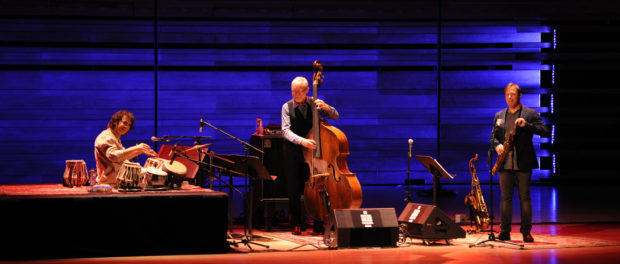King of the Tabla and Other Gods of Music
The creation mythology of jazz tells of the transplantation and fusion of various musical cultures in the 18th and 19th centuries. The slave trade brought north-west African polyrhythms and improvisation to the southern U.S., where they branched out into blues, work songs, gospel, and many other types of music, eventually mingling with European harmony and the brass sections of American marching bands. But that was just the beginning. With each passing decade, jazz absorbed new musical languages, from the West Indies to the Caribbean to Brazil. The trend continues to this day.
Often the point of contact between jazz and any new musical language is rhythm. Syncopation, as well as improvisation, has always defined jazz. So it’s no wonder that in the 1960s, when North American culture was opening up to the east, new collaborations were born between musicians from India and those from America. Think John McLaughlin and the Mahavishnu Orchestra, or Shakti. The complex and intricate rhythmic structures of North Indian tabla playing seemed ripe for merging with the syncopes of jazz.
On Wednesday night three giants played together at La Maison Symphonique in a celebration, through music, of the commonalities between cultures: Chris Potter on soprano and tenor sax, the legendary Dave Holland on upright bass, and the man who made tabla practically a household word in the West, Zakir Hussain.
Before the concert began Hussain was presented with the Antonio Carlos Jobim Award, given to honour artists distinguished in the field of world music and cultural crossover. Ridiculously humble given his monumental musical achievements, Hussain said he didn’t deserve it, and that his musical path was created by the musicians he’d worked with along the way. “Otherwise I’d just be another Indian tabla player,” he modestly claimed.
But he most certainly isn’t “just another Indian tabla player.” His extraordinary virtuosity, creativity, and sensitivity shone during the hour-and-a-half long concert. Some pieces were more heavily focused on the traditional tabla sounds and north Indian rhythms, while others had more of a Western groove. Hussain played a variety of percussion instruments, both north and south Indian and Western, and on occasion used his face as an instrument, to humourous effect. The concert included compositions by all three members of the trio, including J Bhai, by Hussain, written for John McLaughlin, Lucky Seven, by Holland, and Good Hope, by Potter. The careful listening and musical communication, extreme virtuosity balanced with profound musical subtlety, and seemingly divine inspiration made the concert one of those magical musical moments. The audience was rapt and enthusiastic and gave an immediate standing ovation.
The opening act of the evening were no slouches either. Renee Rosnes received the Oscar Peterson Award before her performance, bestowed by Peterson’s daughter Celine. She performed with Lenny White on drums, Steve Nelson on vibraphone, and Robert Hurst on double bass. All extremely accomplished musicians, their sound was generally powerful and energetic, with virtuosic playing by all, most obviously Nelson on vibes. Many of the tunes stood out for the way the group built multi-layered and variegated textures, either on a repeating vamp or in a more free style. There were beautiful, more laid-back moments as well. Definitely a must-listen for fans of contemporary progressive jazz.






